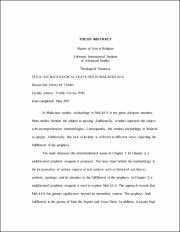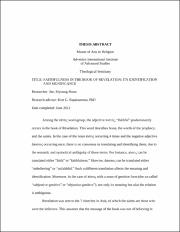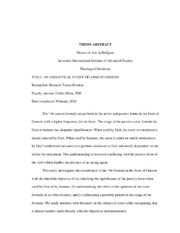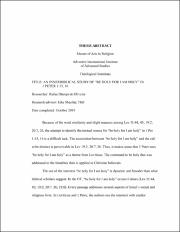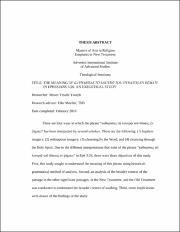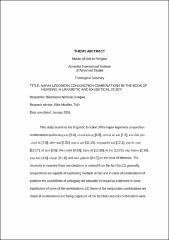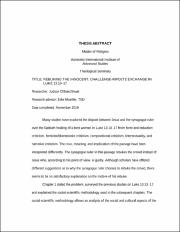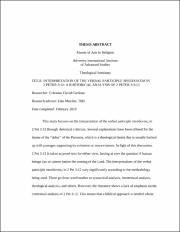Search
Now showing items 1-10 of 19
Eschatological features in Malachi 4:1-6
(Adventist International Institute of Advanced Studies, 2017-05)
In Malachian studies, eschatology in Mal 4:1-6 is not given adequate attention. Most studies mention the subject in passing. Additionally, scholars approach the subject with incomprehensive methodologies. Consequently, ...
Faithfulness in the book of Revelation : it's identification and significance
(Adventist International Institute of Advanced Studies, 2012-06)
Among the πίζηηο word-group, the adjective πηζηόο, “faithful” predominantly occurs in the book of Revelation. This word describes Jesus, the words of the prophecy, and the saints. In the case of the noun πίζηηο occurring ...
An Exegetical study of ARAR in Genesis
(Adventist International Institute of Advanced Studies, 2016-02)
The ארר (curse) formula occurs both in the active and passive forms in the book of Genesis with a higher frequency for the latter. The usage of the passive curse formula by God or humans has disparate significances. When ...
An Innerbiblical study of "be holy for I am holy" in 1 Peter 1:15,16
(Adventist International Institute of Advanced Studies, 2019-10)
Because of the word similarity and slight nuances among Lev 11:44, 45; 19:2; 20:7, 26, the attempt to identify the textual source for “be holy for I am holy” in 1 Pet 1:15, 16 is a difficult task. The association between ...
The authorship of Psalm 22
(Adventist International Institute of Advanced Studies, 2003-11)
There is no consensus on the authorship of Psalm 22.
The superscription of Ps 22 says that it is la-Dawid.
Ancient writers and some modern scholars hold that la-Dawid
indicates Davidic authorship. Some crit i ca l ...
The Meaning of katharisas to loutro tou hydatos en remati in Ephesians 5:26 : an exegetical study
(Adventist International Institute of Advanced Studies, 2016-02)
There are four ways in which the phrase ―θαζαξίζαο ηῷ ινπηξῷ ηνῦ ὕδαηνο ἐλ ῥήκαηη‖ has been interpreted by several scholars. These are the following: (1) baptism imagery, (2) redemption imagery, (3) cleansing by the Word, ...
Hapax legomena conjunction combinations in the book of Hebrews : a linguistic and exegetical study
(Adventist International Institute of Advanced Studies, 2016-01)
This study examines the linguistic function of the hapax legomena conjunction
combinations (καθώσπερ καὶ [5:4], εἰ καὶ οὕτως [6:9], επειτα δὲ καὶ [7:2], καὶ ὧδε μὲν . .
. ἐκεῖ δὲ [7:8], oθεν καὶ [7:25], καὶ εἰ μὲν [11:15], ...
Rebuking the innocent : challenge-riposte exchange in Luke 13:10-17
(Adventist International Institute of Advanced Studies, 2019-11)
Many studies have explored the dispute between Jesus and the synagogue ruler over the Sabbath healing of a bent woman in Luke 13:10–17 from form and redaction criticism, feminist/liberationist criticism, compositional ...
The Meaning of Jesus' EPXOMAI 'coming' statements in Revelation 2 and 3
(Adventist International Institute of Advanced Studies, 2014-09)
Scholars are divided as to whether Christ's tpyopa{ statements in Rev 2:5,16. and,
3:11 refer to personal judgments, or to Christ's literal second advent at the end of the
eschaton. For {pyopa( to represent personal ...
Interpretation of the verbal participle Speudontas in 2 Peter 3:12 : a rhetorical analysis of 2 Peter 3:3-13
(Adventist International Institute of Advanced Studies, 2018-03)
This study focuses on the interpretation of the verbal participle σπεύδοντας in 2 Pet 3:12 through rhetorical criticism. Several explanations have been offered for the theme of the “delay” of the Parousia, which is a ...

